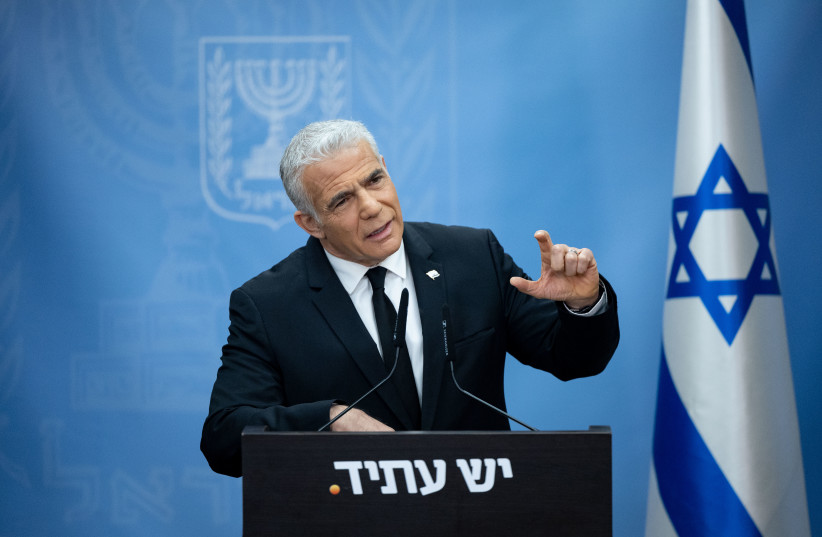The opposition could return to the negotiating table over the government’s judicial reforms as long as the controversial “reasonableness standard bill” does not become law, opposition leader Yair Lapid said Monday.
National Unity Party chairman Benny Gantz on Monday launched a campaign titled “Taking Responsibility – Stopping the Judicial Overhaul and Returning to Talks.”
The statements by both opposition leaders mark a change in their positions vis-à-vis the talks, as they previously demanded as a precondition to the resumption of talks that the coalition convene the committee responsible for electing Israel’s judges.
Both Lapid and Gantz have appeared to drop that demand. The coalition is set to elect its representative to the Judicial Selection Committee on Wednesday.
However, Justice Minister Yariv Levin has not committed to convening the committee, which would begin its work to fill dozens of vacancies in the court system.

On Monday, Gantz said he had spoken with President Isaac Herzog earlier in the day and requested that he “convene the prime minister, the opposition member and myself” to “discuss the immediate halt of legislation and a return to talks prior to the vote.”
Gantz was referring to the first reading of the “reasonableness standard bill.” The vote was expected to take place Monday evening. The coalition was pushing forward in a one-sided manner after talks at the President’s Residence broke down last month.
According to a video that circulated on Monday as a part of National Unity’s campaign, the government after passing the reasonableness standard bill will attempt to “politicize” the election of judges by altering the makeup of the Judicial Selection Committee, attempt to pass a bill to restrict the power of the attorney-general and the legal advisers in each government ministry, and launch a series of initiatives, including the firing of Attorney-General Gali Baharav-Miara, which will lead to a “severe blow to democracy.”
What is the reasonableness standard bill?
The reasonableness standard bill is an amendment to Basic Law: The Judiciary, which would block the courts from applying what is known as the “reasonableness standard” to decisions made by elected officials. The reasonableness standard is a common-law doctrine that allows for judicial review against government administrative decisions that are deemed beyond the scope of what a responsible and reasonable authority would undertake.
Proponents of the law say it is a highly subjective tool for judicial activism that allows the court to subvert government policy with its own views. Critics, including the attorney-general, argue that the tool is essential to counter corruption and to ensure the protection of individuals from arbitrary and capricious government decisions.
The court used the reasonableness standard, for example, when it ruled in January that Prime Minister Benjamin Netanyahu’s decision to appoint Shas chairman Arye Deri to two ministerial positions, despite three criminal convictions on white-collar crime committed while in power, suffered from “extreme unreasonableness.” Netanyahu was forced to fire Deri.
Should the reasonableness standard bill pass into law, Netanyahu may attempt to reappoint Deri to his former positions of health minister and interior minister.
Yisrael Beytenu chairman Avigdor Liberman on Monday criticized Lapid and Gantz for calling for a resumption of talks at the President’s Residence. Netanyahu’s attempt to delay the elections to the Judicial Selection Committee had removed all doubt that the talks were a scam, he said.
Liberman also called on the Supreme Court to strike down the reasonableness standard bill and deem it unconstitutional should it pass into law.
National Unity’s campaign began a day after the government blasted Baharav-Miara and other top officials in the Justice Ministry over what it claimed was “selective enforcement” against protesters against the judicial reforms.
A number of ministers called during the cabinet meeting for Baharav-Miara’s removal, and Netanyahu, in closed-door meetings, did not rule out removing her from her position, KAN News reported Sunday. The Likud denied the report.
“Dismissing the attorney-general would be a declaration of war on Israeli democracy,” Labor chairwoman Merav Michaeli said Monday, adding that the government was “playing with fire.”
Lapid and Gantz also criticized the government’s conduct with the attorney-general.
The “government has become unhinged,” Lapid said.
Gantz said the “hazing” of Baharav-Miara had two purposes: to deter her from fulfilling her job and to prepare the ground for her eventual removal.
Netanyahu sent a message to Herzog, saying he would not agree to return to talks after the bill passes its first reading, KAN News reported Monday evening.
Michael Starr contributed to this report.
